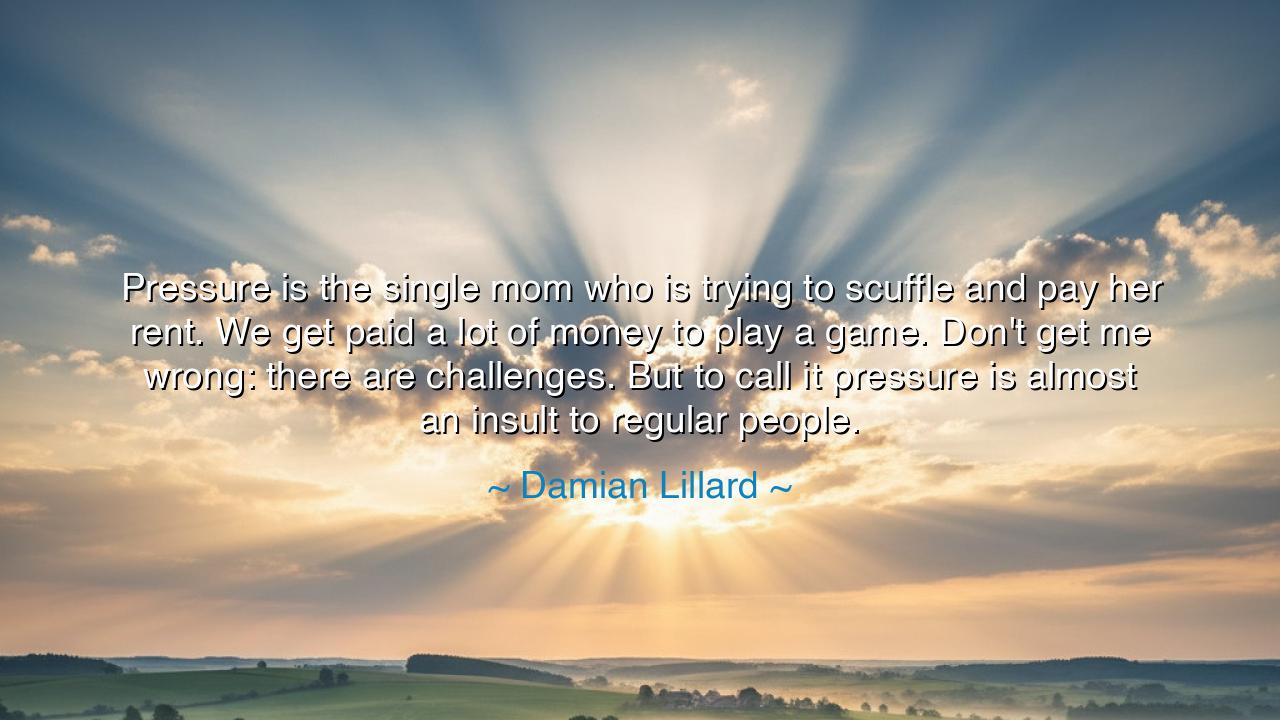
Pressure is the single mom who is trying to scuffle and pay her
Pressure is the single mom who is trying to scuffle and pay her rent. We get paid a lot of money to play a game. Don't get me wrong: there are challenges. But to call it pressure is almost an insult to regular people.






When Damian Lillard said, “Pressure is the single mom who is trying to scuffle and pay her rent. We get paid a lot of money to play a game. Don’t get me wrong: there are challenges. But to call it pressure is almost an insult to regular people,” he spoke not merely as an athlete, but as a philosopher of humility. His words, though born in the world of basketball, echo far beyond the court — they are a hymn to perspective, a tribute to the quiet strength of ordinary people who face extraordinary burdens every day. In his voice, we hear the wisdom of a man who refuses to confuse difficulty with despair, or competition with survival. What he calls pressure, others might call a privilege; and in recognizing this, Lillard rises above ego into the realm of truth.
In the ancient world, the sages often spoke of proportion — of knowing one’s place in the vastness of life. They taught that wisdom begins when we see ourselves clearly, neither exaggerating our trials nor diminishing the struggles of others. Lillard’s words carry that same spirit. As a professional athlete, he lives under bright lights, cheered and criticized in equal measure. Yet he refuses to make himself the center of suffering. Instead, he turns his gaze outward, toward those unseen in the crowd — toward the single mother, the laborer, the teacher, the caregiver — those whose strength is not celebrated on television, but whose courage sustains the world. By doing so, he restores honor to the everyday hero, reminding us that the truest form of greatness is empathy.
The origin of this quote lies in an interview where Lillard was asked about handling pressure in the NBA. His response was not rehearsed; it was instinctive — born from gratitude and groundedness. Raised in Oakland, California, he grew up surrounded by the struggles of working families, by those who labored not for glory, but for survival. He saw firsthand that real pressure is not the weight of expectation from fans or media; it is the weight of responsibility borne by those who fight simply to keep a roof overhead or food on the table. For Lillard, basketball is a challenge, yes — but it is also a blessing. His humility, forged by the reality of his upbringing, gives his success a rare and enduring depth.
Consider, for a moment, the story of Antaeus, the giant of Greek myth who drew his strength from the earth. Each time he touched the ground, he was renewed, unstoppable. In the same way, Lillard’s strength comes from his connection to reality — to the earth of his people, to the struggles that ground him in gratitude. He has not floated away into the illusions of fame; he has remained rooted in empathy. His acknowledgment of the single mother, struggling to pay rent, is more than metaphor — it is his way of kneeling to the soil that gave him strength. For the ancients knew: the man who forgets his roots is already falling, no matter how high he climbs.
There is a deep moral humility in these words. In an age when many equate wealth or status with hardship, Lillard’s statement cuts through illusion. He reminds us that gratitude is the shield of the strong — that true perspective protects the spirit from arrogance and despair alike. To complain of “pressure” in the face of privilege is to forget how fragile life can be for those without safety nets. Yet Lillard does not shame success; rather, he calls for awareness — the kind that turns comfort into compassion. His message is not one of guilt, but of responsibility: if you have been blessed with power or stability, then use it to honor those who endure without it.
The lesson is as old as the first fireside teachings: remember the unseen struggles. Every person you pass may be carrying a weight invisible to the eye — the bills unpaid, the sickness unspoken, the hope barely hanging on. Let this truth make you kinder, steadier, more grateful. And when you face your own trials, as all must, measure them wisely. Ask yourself: is this true pressure, or merely the discomfort of growth? In that question lies maturity — the wisdom to distinguish between hardship and perspective, between complaint and gratitude.
So, my listener, carry forward Damian Lillard’s wisdom as the ancients carried their proverbs: engraved not on stone, but on the heart. When you feel burdened, remember the single mother, the worker, the forgotten soul who toils unseen. Let their resilience give you perspective, and let your blessings become your service. For strength is not measured by the weight one bears, but by the grace with which one bears it — and the awareness that others carry far more.
Thus, as Lillard teaches, the true hero is not the one who conquers arenas, but the one who endures life’s daily battles without applause. And if we can live with that humility, that reverence for the unseen courage of others, we will begin to understand what the ancients called honor — not the honor of victory, but the honor of understanding.






AAdministratorAdministrator
Welcome, honored guests. Please leave a comment, we will respond soon